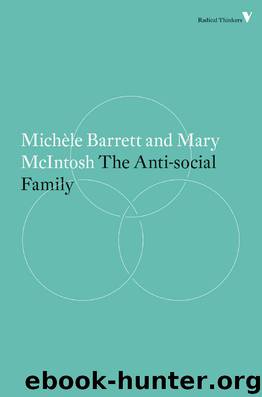The Anti-Social Family (Radical Thinkers) by Michele Barrett & Mary McIntosh

Author:Michele Barrett & Mary McIntosh [Barrett, Michele]
Language: eng
Format: epub
ISBN: 9781781687604
Publisher: Verso Books
Published: 2015-01-27T00:00:00+00:00
(ii) ‘The family has declined and much of its work is now undertaken by the state.’
This proposition has more immediate political purchase than that concerning capitalism and the nuclear family, but it forms part of the same train of thought. The family as a social institution is seen as having a historical trajectory, developing into a privatized nuclear form which is then vulnerable to state intervention in matters relating to the reproduction of a domesticated workforce. Evidence of the family being ‘taken over’ by the state tends to fall in two categories. The first, usually invoked by those who bemoan it, is the rise in divorce and illegitimacy and the supposed decline in devotion to family values. The second, more broadly acknowledged, being the increased role of state provision in care of the sick, aged and unemployed, and in the education of children.
These themes are well-trodden ground and it is not necessary for us to review the debate in detail. Two points must be stressed, however, in arriving at a view on it. The first is that, without exception, analyses of the relationship between family and state are linked to specific political positions. The second is that the way in which the relationship is posed depends upon what ‘the family’ is taken to represent. This may sound obvious, but it is of considerable significance. We can begin to consider this by looking at what David Morgan has set out as the four possible positions on a debate that involves ‘an interrelated set of arguments about facts and values’.18 Morgan says the options are:
1. The family is in decline and this is socially detrimental.
2. The family is in decline and this is either all to the good or a natural stage in the evolution of mankind.
3. The family is not in decline and this is all to the good.
4. The family is not in decline and this is socially and individually detrimental.
Morgan comments that the main debate is between 1, the position of moral entrepreneurs and thought of as the ‘popular’ view, and 3, the main position taken by sociologists. Options 2 and 4 are relatively marginal.
Seen in this way, the principal assumption at the heart of the ‘declining family’ debate is that the family is the site of moral values. What is at stake between the moral entrepreneurs and the sociologists is the definition of family morality. The classic instance of this is Ronald Fletcher’s pop-sociology book, The Family and Marriage in Britain,19 which argues that the contemporary family is a vast improvement on any earlier versions. Responsibilities for health and education are lifted from its shoulders, the availability of divorce has made marriage much more popular and stable, the family is now much less oppressive to women and children – in short, it provides a much nicer environment for its basic job of providing warm affective relationships in a home with a relatively high standard of living. Fletcher believes that the family is now a more satisfying, equal and fulfilling means of providing sexual relationships, parenthood and home-making.
Download
This site does not store any files on its server. We only index and link to content provided by other sites. Please contact the content providers to delete copyright contents if any and email us, we'll remove relevant links or contents immediately.
| General | Men |
| Women in History |
Cecilia; Or, Memoirs of an Heiress — Volume 1 by Fanny Burney(32558)
The Great Music City by Andrea Baker(32018)
Cecilia; Or, Memoirs of an Heiress — Volume 2 by Fanny Burney(31956)
Cecilia; Or, Memoirs of an Heiress — Volume 3 by Fanny Burney(31941)
We're Going to Need More Wine by Gabrielle Union(19046)
All the Missing Girls by Megan Miranda(16027)
Pimp by Iceberg Slim(14506)
For the Love of Europe by Rick Steves(14121)
Bombshells: Glamour Girls of a Lifetime by Sullivan Steve(14075)
Talking to Strangers by Malcolm Gladwell(13370)
Norse Mythology by Gaiman Neil(13363)
Fifty Shades Freed by E L James(13240)
Mindhunter: Inside the FBI's Elite Serial Crime Unit by John E. Douglas & Mark Olshaker(9342)
Crazy Rich Asians by Kevin Kwan(9292)
The Lost Art of Listening by Michael P. Nichols(7506)
Enlightenment Now: The Case for Reason, Science, Humanism, and Progress by Steven Pinker(7313)
The Four Agreements by Don Miguel Ruiz(6765)
Bad Blood by John Carreyrou(6621)
Weapons of Math Destruction by Cathy O'Neil(6279)
